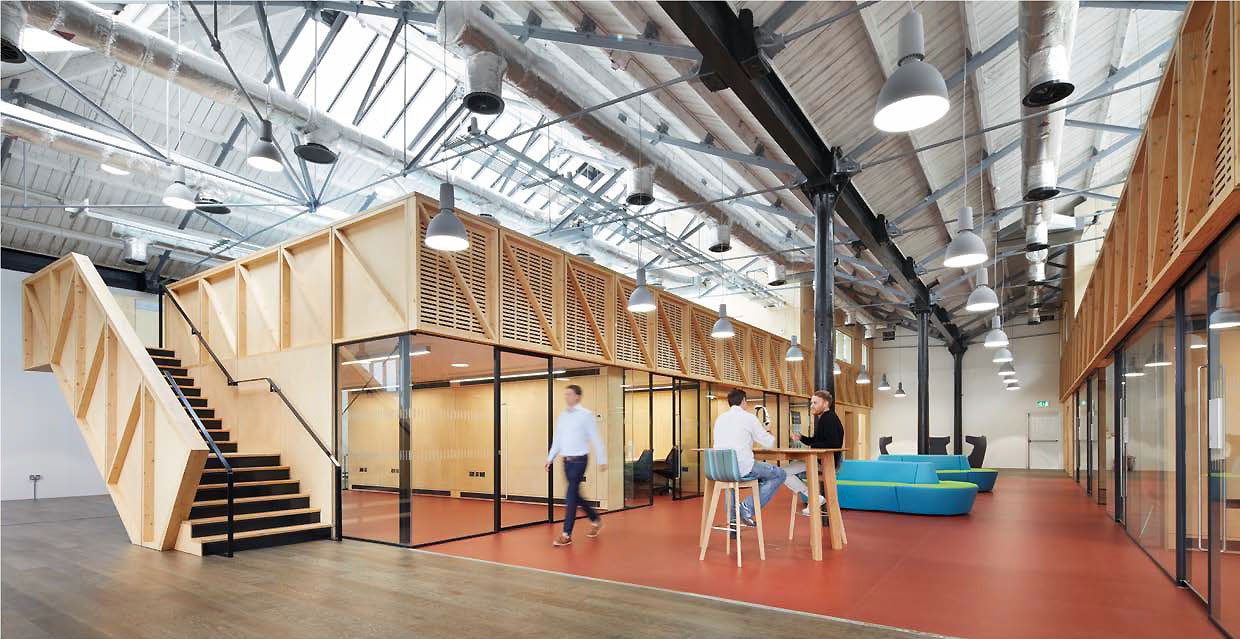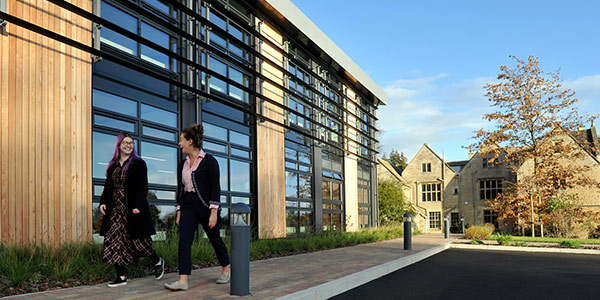PgCert in Retrofitting, Regeneration and Sustainability in Historic Buildings
This programme is designed to equip learners to pursue careers in historic built environment conservation, regeneration and retrofitting. It focuses on developing your essential skills, methods and approaches to the repair and retrofit of historic buildings as well as inculcating the initiative, adaptability, decision-making and self-direction required for wider regeneration work.
Course overview
The course has two main strands:
The first focuses on the practicalities surrounding the conservation and retrofitting of historic buildings. This includes the ethical considerations around identifying conservation-appropriate methods, materials, designs and finishes. It also explores the options – and challenges – associated with sensitively improving the performance and sustainability of historic and traditional buildings, including the identification of inappropriate previous interventions. This includes understanding and correctly interpreting building pathology and using this data to inform decision around materials and interventions as well as monitoring and evaluating the results.
The second focuses on the potential of historic buildings to contribute to wider regeneration of an area. Here we concentrate on putting buildings to work in the community, moving away from thinking of buildings as their footprint of the building and towards a viable future use. We examine the economics of regeneration, including the role of partnerships with heritage organisations, local groups and business to draw on and generate local momentum and investment.
If you are interested in studying cultural heritage research but cannot commit to the full MSc programme then studying for a Certificate (PgCert) may be the route for you. It is designed to give you a broad and thorough grounding in the sector to pursue a variety of careers.
What is a Postgraduate Certificate?
The PgCert - or Postgraduate Certificate – is the shortest of our Postgraduate level offerings, which is completed by studying four modules (60 credits). It allows you to study business skills in depth but takes less time to complete than the MSc or Postgraduate Diploma.
The PgCert is a great way of fitting postgraduate study around a busy life. Full-time students can complete the course in as little as one year. Part-time students can choose to spread the course up to two years, giving you lots of time for thinking and writing between modules. It is ideal if you want to study a specific subject but would rather not commit to a full MSc with its attendant time and financial costs.
It can be a great way to boost your career or enter a new industry, but if you desire to continue your studies PgCert credits can be used to contribute towards a PgDip or even an MSc qualification later down the line. Completing studies using this route is often likened to building blocks – one step at a time – the first step being a PgCert.
For students joining in January 2026, teaching for the courses will start at RAU Swindon, and from Tuesday 29 September 2026 all courses will be taught at the main RAU campus in Cirencester.
*Please note that overseas applicants who require a Student visa cannot be considered for this course as the weekly contact hours do not meet the UKVI threshold for a full-time Student visa.
Course content
Here at the RAU we are always looking for ways to better support our students. We recognise that a number of our students may be working or have caring responsibilities alongside studying which can sometimes make it difficult to attend every teaching session in person. As such we have the ability for you to join lectures and seminars through an alternative digital format in prior discussion with your programme leader. Please note that for international students on a student visa you are expected to attend your classes in person. Remote delivery is not an UKVI authorised mode of attendance for the taught element of your course and therefore non-attendance would affect your student visa.
All sessions are offered in a hybrid format and you can choose whether to attend any session in-person or to participate remotely, as best suits your needs. We do recommend that you attend field trips in-person to get the most from your experience. All in-class sessions are recorded live and made available to students who prefer to access the sessions asynchronously.*
Our sessions are built around exercises to support and scaffold the learning process, and to provide valuable opportunities for peer-to-peer learning. Material is taught in workshop format combining formal elements, such as lectures, with more hands-on exploratory or consolidatory exercises, for example discussions, ‘live’ group research to explore or apply a particular concept, group-critique sessions, supported writing exercises, and problem-based learning.
*Visa students will need to attend all sessions in person due to UKVI visa requirements.
Course structure
Our PgCert is designed to be ultra-accessible. All classes are offered both in person and synchronously online, with session recordings available for students unable to attend a particular session.
Timetables
Timetables are normally available one month before registration.
The in-person teaching sessions are timetabled on Thursdays and Fridays, with each module being taught 10:00-12:00 and then 13:00-15:00/16:00 on the same day, each week, for the full year (both semesters). This allows you to fulfil other commitments you may have, such as work, family and interests. Full-time students study on both days, with part-time students on just one.
Modules
- Practical Conservation, Retrofitting and Sustainability:
- Regeneration & Placemaking in the Historical Environment
A description of each module can be found here.
* Optional additions to the course will incur additional charges
Disclaimer information
The University has established various rules and regulations that you must agree to and follow if you accept an offer to study with us. View our full disclaimer notice.
Careers and graduate destinations
- Historic building conservation
- Urban or rural regeneration / retrofitting
- Conservation and regeneration work within local authorities, heritage organisations, museums and the private sector which require specialists with a buildings and structures focus
It also provides an excellent grounding for further academic study, for example at PgDip or MSc level.
Entry requirements
We welcome applications from applicants with non-standard qualifications who are able to demonstrate knowledge, experience and skills developed in the workplace or elsewhere and which are relevant to the programme of study. Applicants will need to use their personal statement to provide further details supported by a CV. All non-standard applications will be considered by the Programme Manager on a case-by-case basis and applicants can expect that an interview may be required as part of the admissions process.
If English is not your first language, you will need to reach the requirements outlined in our English language requirements for the level of study. For postgraduate taught programmes this is IELTS Academic min. overall 6.5 with no element below 5.5 (or equivalent). English language tests usually have a validity of 2 years from the date the test is taken.
Offers will typically be made in line with the academic requirements set out above. Offers can be conditional or unconditional. An unconditional offer will be made to applicants who have already met the conditions and provided evidence that conditions have been met. Where academic or language requirements have not yet been fulfilled, applicants will receive a conditional offer stating the requirements that must be met.
Fees
2025-26 Applicants (January 2026 entry)
For the academic year 2025-26 the tuition fees for this course are:
| UK | *Overseas/EU | |
|---|---|---|
| Full-time | £3,800 per year | £7,350 per year |
| Part-time | Fees are calculated on a pro-rata basis depending on the number of modules taken. Please refer to Tuition Fees webpage | N/A |
*Please note: International students can study on a part-time basis only if they are in the UK with a different type of visa (other than Student Visa/Tier 4 General) that allows them to undertake part-time study and their visa does not expire prior to the end date of the proposed course of study. Please check your Visa eligibility before applying.
There are no additional fees for any activity conducted during the teaching days. Expenses (travel and admission) incurred during self-directed visits will however fall to the student – all activities are structured so they can be undertaken at any heritage location near to the student and either free or at minimum cost.
Please contact admissions@rau.ac.uk before you apply to confirm your eligibility.
Tuition fees may be subject to an inflationary increase each year as set out in our Access and Participation Plan.
For full details, please visit the fees and funding webpage.
Apply now for January 2026 entry
To apply for a postgraduate course you need to complete an online application form. This can be found by selecting your preferred course option at the bottom of this box.
Alternatively, if you cannot access the online form please call Admissions on 01285 889912, or email admissions@rau.ac.uk.
We recommend you keep a copy of the completed form for your records.
Important Information for EU and Overseas applicants for PgCert: The PgCert programme is equivalent to part-time study for UKVI student visa purposes. Please note that the University only sponsors full-time PgDip and MSc level students.
EU and Overseas students who hold another UK immigration status/visa can be considered for the PgCert provided their visa/status allows study at the time of application and covers the entire period of study.
Application deadline, January entry:
- EU and overseas applicants requiring a study visa should submit their application by 1 December 2025 at the latest, applications received after this may be considered for September entry
- UK applicants should aim to submit their applications the latest by 5 January 2026
Results deadline, January entry:
- EU and overseas applicants will need to meet their conditions by 8 December 2025
- UK applicants will need to meet their conditions by 7 January 2026
Applicants will be notified via email once a decision has been made and decision letters will be emailed to you. If there is a deadline by which applicants must accept an offer of admission or pay a deposit, this will be stated in the offer letter.
Requests to defer the year of entry will be considered only when an applicant holds an Unconditional offer and needs to be submitted in writing to the admissions team. We cannot guarantee that requests will be granted. Decisions on deferral requests are considered:
- For January entry at the end of January (or later)
If the deferral request is granted applicants will receive a new offer letter with tuition fees which are applicable to their year of entry, at the opening of the next admissions cycle.
Please choose a course from the options below to apply.


